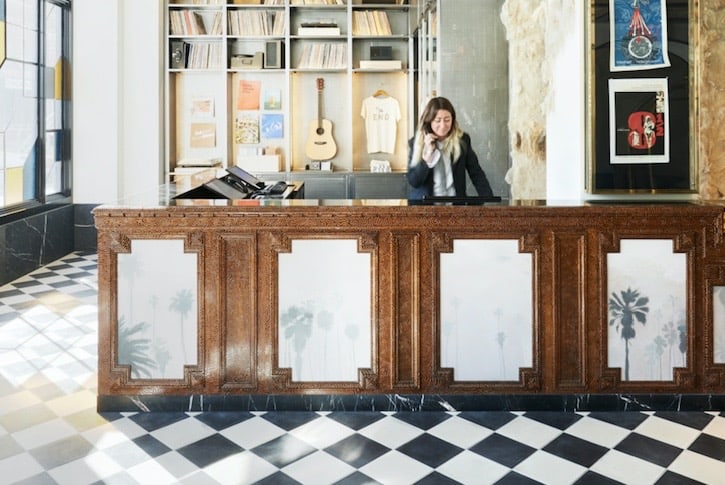Written for BLLA Symposium in Santa Monica
Hotels: cultural influencers and influences
Influence is the lifeblood of today’s commercial world. Savvy brands understand the power of harnessing influencer networks, creating brand collaborations and leveraging cultural capital – whatever it takes to spur the public into action. As industries look to their peers for inspiration, we explore the hotel scene.
Marketing insight leaders, The Drum, coined this movement. “Brands have to work much harder to keep hold of customers and to win new ones, and now influence is becoming more and more the driving force behind maintaining customer loyalty and market share.”
Whether it’s a symptom of social media, digital commerce or just that people can now buy anything at any time, it’s a trend that is with us for the foreseeable.
The ability to impact decision making isn’t easy – factors such as prestige, wealth, trust, affability and reach become critical. Hotels have a loyal following, international kudos and a genuine brand experience, which enhances their ability to impact community, lifestyle and culture. Having both a global and local reach – with worldwide networks and neighbourhood footprints – only enhances the potential to influence and mobilize.
What, then, do they do with this power? One could debate whether hotels should then serve a more responsible message. Gently pondering upon zeitgeist industry buzzwords – sustainability and responsibility – leads to 1 Hotels, founded by the chap that bought you W Hotels, Barry Sternlicht.
1 Hotel is the eco-warrior hotel that started life in Miami’s South Beach, and has just opened in Central Park, NY. The core premise of the hotel, coined by Sternlicht, is, “We’re not a brand, we’re a cause”. By using natural materials throughout the build process, offering a near-paperless bedroom experience and recycling paper room keys, do not disturb signs and coat hangers, 1 Hotels has developed a sense of environmental responsibility amongst guests, whilst servicing a huge gap in the sustainable hotel market. Despite the admirable success so far, they admit that being more environmentally aware is a journey.
The cultural pillars of art, design, music, film and food & drink are the essence of any brand marketing strategy. This allows hotels to achieve active engagement from desirable demographics – in the hopes they will mean something more to the customer than just a hotel.
As Square Meal magazine Editor, Damien Gabet, observed, “The most forward-thinking hotels are magnets for a culture-hungry-crowd of Londoners that want to see and be seen”. Manifestations of this include programmed events within the hotels, retail stores, art installations and jaw dropping restaurants and bars. Hotels are beginning to operate brand and marketing endeavours more akin to museums and cultural destinations – because it appears that being a hotel just isn’t enough anymore.
Emanating from this is an ever-increasing number of strategic brand alliances and achingly hip collaborations – with the aim of borrowing cultural credibility from each partner. Ace Hotels are fond of creating lifestyle products for every touchpoint of their guest’s journey. The group found that a bag, a coat, even a Converse-branded shoe can kick-start a long-running partnership between two brands.
Further evidence is seen in the relationship between W Hotels New York and Ray Mendez, creative director for Lady Gaga, Will.I.Am and 50 Cent. This saw the creation of five skateboards designed by David LaChapelle, Cara Delevingne, Amar’e Stoudemire, Cope2 and Zana Bayne, with the option to buy the prints of these limited edition skateboards. This gave birth to an overnight package called Room & Board, which includes board rental during your stay, one pro skateboarding lesson and a print of all board designs. The partnership between Dorchester Collection and Smythson also springs to mind, where a simple tweet prior to arrival gifted a Smythson notebook in your bedroom.
Last year Morgans Hotel Group announced a global partnership with Vice Media’s food channel Munchies to create “Dinner Party”. This was a gateway city-roaming, high-concept, culinary event that toured each of the Morgans’ properties throughout London, New York, Los Angeles, Miami and San Francisco. This partnership gave MHG unrivalled access into the online food hub’s hugely influential audience and collaborators – that’s 5.5million YouTube subscribers – but perhaps more importantly, positioned the hotel group as a thought leader for culturally astute nightlife.
With the power of influence growing at a rate of knots, the only riddle left for hoteliers is that of a genuine, honest retail experience. Even the most well heeled travellers can feel a mixture of intimidation and manipulation whilst browsing a hotel store when the merchandising doesn’t quite match the demographic.
“Shops are one of the remaining opportunities hotels have for people to say ‘This place is different, better, cleverer and more exciting than I expected,’ ” says Bjorn Hanson, Hospitality, Tourism and Sports Management at New York University.
The retail experience in many hotels can feel like wasted space, no matter how glittering the jewellery on those glass shelves. The Standard has created compelling on and off line stores that vary according to season and city. In New York the store features sundries, gift items, art books, periodicals, and accessories from labels like Dita, Ben Medansky, Mast Brothers, Want Essentials, Comme des Garçons, Mania Mania, and Yellow Owl. On offer at The Standard Miami shop is surf and sun apparel, from bikinis to bronzer to board shorts – in addition drugstore basics alongside art. The shop carries designers like Eres, Retrosuperfuture, Sundek, Lemlem, Kiini Swim, La Perla, Illesteva, Soludos, and Melissa Shoes. Meanwhile Ace has created brand partnerships with limited offerings from NY clothing stores Opening Ceremony and Project No.8. The late Founder of Ace, Alex Calderwood, told The New York Times, “If it’s done right, retailing is another layer that makes the overall experience more engaging. You want guests to find things they may not see everywhere else.”
Only a handful of hotels are sufficiently clued-up about their guests to be able to produce a specific retail experience that delivers. Success lies in the core of hospitality – knowing the guest. Only then can you influence them.









